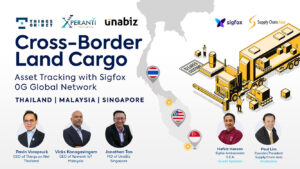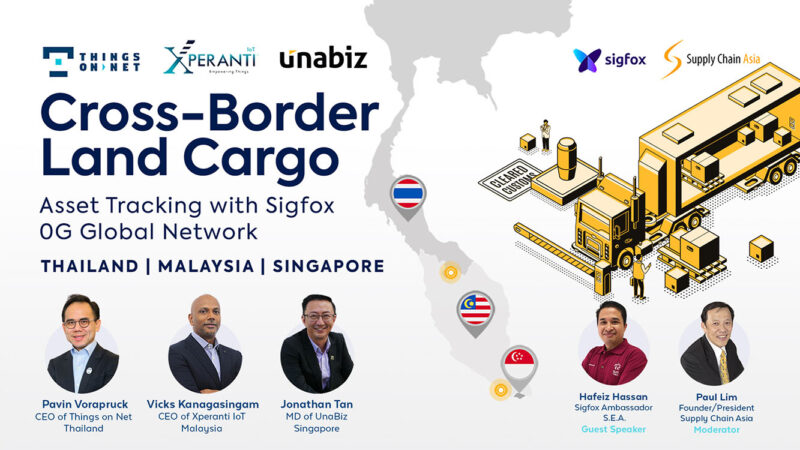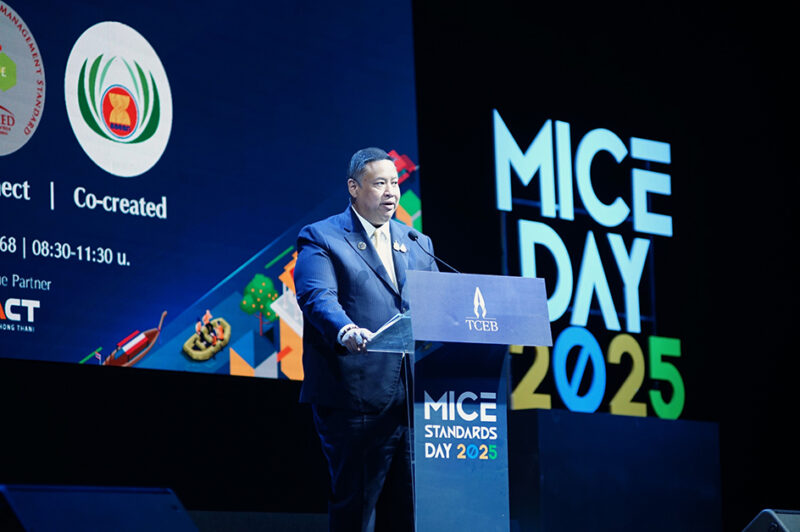
Bangkok, 2nd December 2020 – Sigfox Operators across 3 Southeast Asian countries – Things on Net, UnaBiz, and Xperanti (TUX), have joined forces to address supply chain bottlenecks by facilitating a seamless and cost-effective land cargo asset tracking between Singapore, Malaysia & Thailand respectively.
In a recent webinar discussing cross-border asset tracking using Sigfox 0G Network, the 3 main panellists together with moderator Paul Lim (President and Founder of Supply Chain Asia) deliberated on the current status of cross border trucking and on staying connected across supply chain borders while navigating COVID-19 disruptions.
CROSS-BORDER TRUCKING IN S. E. A.
The growth of the consumer markets and household spending in Southeast Asia, has given a healthy boost to the cross-border trucking business in the region as land freight can be faster than ocean transport (due to shorter transit time) and cheaper than air freight.
Pavin Vorapruck (CEO, Things on Net) said, “Cross-border trade between Thailand-Malaysia-Singapore is amongst the busiest borders in SEA. Land freight accounts for over 60% of the total freight between these countries currently. Time and flexibility is the most crucial reason why FMCG companies prefer land freight. The allowance for different departure times, flexible transport routes between neighbouring countries and fast door to door delivery keeps land freight running round the clock.”
NAVIGATING COVID-19 DISRUPTIONS
COVID-19 is disrupting global distribution on a scale unseen in recent times. Increased border controls and customs regulations are creating extreme challenges for logistics companies. Globally, freight carriage by road is found to have reduced by at least 30 percent. However, despite the lockdown imposed on Singapore and Malaysia borders to combat the spread of the coronavirus, the flow of goods and cargo between Singapore and Malaysia, including food and medical supplies, remains undisrupted.
In the aftermath of COVID-19, some countries have started measures to expedite the shift to digital platforms. The Singapore government for example, has recently announced an initiative to build a new common infrastructure to promote an open and trusted sharing of data across the fragmented supply chain ecosystem. Developed by a group of industry players from both the public and private sectors, the new initiative seeks to connect the existing data platforms of importers and exporters, shipping companies and financial institutions, helping to reduce dependency on physical documents and instances of fraud, among other benefits.
“As the pandemic evolves, logistic supply chain players need to accelerate digitalisation to prevent bottlenecks and increase visibility. Sigfox 0G network is designed to address the four key challenges of supply chain digitalisation: the lowest cost per message for data collection, ultra-long battery autonomy of up to 11 years without a charge, simple to deploy and maintain, and lastly, the potential to scale the same solution in over 70 countries globally. By signing a single contract with the local operators enjoy fuss-free connectivity without the hassle of switching networks as your goods transits across borders,” Jonathan Tan, Managing Director of UnaBiz Singapore commented.
Staying Connected Across Supply Chain Borders
GSM tracking systems are common, but they are not a fool-proof solution for cargo tracking when it comes to cross border transportation due to Cargo Trucks Restriction. Unlike in the EU, where trucks can easily cross borders, commercial vehicles in Southeast Asia, registered in one country, cannot enter the other country. For example, Malaysian trucks cannot enter Thailand, and Thai trucks cannot enter Malaysia. As a result, even if the cargo company is willing to track its vehicles by paying roaming charges, roaming tracking devices needs to be deployed at a micro-level of the container, pallet or packaging box because the cargo needs to change trucks at the key border points.
Vicks Kanagasingam (CEO of Xperanti) shared that a client, a large logistics company in Malaysia, faced the challenge of keeping track of where all its fleet vehicles were at any one time. “Our client had to maximise the availability of its haulage assets, such as trailers and containers, so that they could be utilised efficiently, to avoid service disruption to its customers. Using our smart logistics solution based on Sigfox IoT network, the client was able to increase asset usage and efficiency, resulting in a reduction of up to 80% in wait time before the cargo take-over happens.”
“We leverage on Sigfox’s innovative lightweight network solution and collaborate with mobile operators to complement existing high bandwidth protocols, such as 4G & 5G, to help customers solve challenges effectively,” he added.
On top of cargo tracking, the Sigfox network also supports other low-power cost-efficient sensors such as temperature and humidity which are complementary to asset tracking in the F&B and pharmaceutical industry for cold chain monitoring.
Hafeiz Hassan (Sigfox Ambassador S.E.A & CEO of Singularity Aerotech Asia) explained, “For us as adopters of the Sigfox technology, the appeal is in the simplicity and affordability of the solution. As an end-to-end solution provider, our main interest is to solve our customers’ problems using technologies that can be adopted by the market very quickly.”
About Sigfox:
Sigfox’s long range and low power 0G network is a seamless global network supported by over 70 network operators around the world. The lightweight network provides a secure way for logistic companies operating regionally and internationally to collect data, monitor and track goods without investing heavily on expensive and complicated roaming systems or changing SIM cards. With improved visibility of their goods round the clock, 24/7, logistics companies can ensure an uninterrupted supply of essential goods and customer satisfaction.






